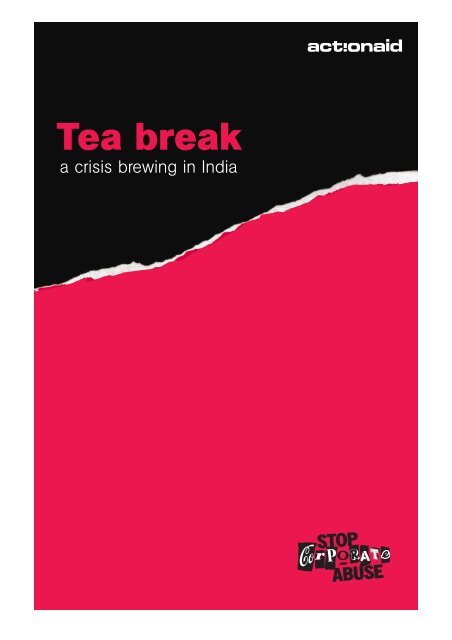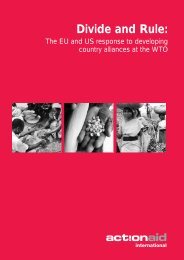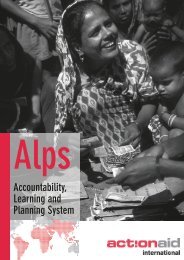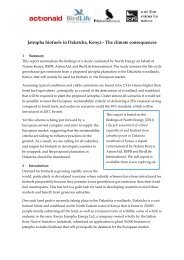Tea break - ActionAid
Tea break - ActionAid
Tea break - ActionAid
- No tags were found...
You also want an ePaper? Increase the reach of your titles
YUMPU automatically turns print PDFs into web optimized ePapers that Google loves.
<strong>Tea</strong> <strong>break</strong><br />
a crisis brewing in India
<strong>Tea</strong> <strong>break</strong>: a crisis brewing in India<br />
<strong>Tea</strong> <strong>break</strong><br />
a crisis brewing in India<br />
“Earlier we used to buy fish or meat once or twice a week. Now<br />
that has stopped completely. We can't even think of it on wage<br />
day… Can't cut down on rice because it fills everyone's stomachs<br />
but we can't afford vegetables and dal any more.”<br />
Chandran, a worker on a plantation owned by Hindustan Lever, Tamil Nadu, India. 1<br />
Summary<br />
<strong>Tea</strong> is a national institution in the UK. But in the tea<br />
plantations of India there lies a tale of poverty, hunger<br />
and a denial of workers’ rights. Since the late 1990s, at<br />
least 60,000 workers have lost their jobs as tea prices<br />
have fallen and plantations have closed down. Tens of<br />
thousands of workers are threatened by further<br />
closures. On the plantations that remain open, workers<br />
are suffering wage cuts, tougher picking demands,<br />
increasing short-term, insecure contracts and appalling<br />
living and working conditions.<br />
Yet major global tea companies such as Unilever and<br />
Tata <strong>Tea</strong>, which buy and blend the leaves in our PG Tips<br />
and Tetley tea bags, are reaping large profits. These<br />
companies are failing to take sufficient responsibility to<br />
safeguard the rights and livelihoods of the millions of<br />
tea growers and workers who contribute to their profits.<br />
<strong>ActionAid</strong> joined together with Indian civil society<br />
groups, and conducted interviews with workers on<br />
Davershola tea plantation owned by Hindustan Lever, a<br />
Unilever subsidiary, and with smallholder tea growers in<br />
the Gudalur valley in Nilgiris, Tamil Nadu, in June 2004<br />
and April 2005. The interviews provide a snapshot of<br />
the problems facing workers and tea growers<br />
throughout the Indian tea sector.<br />
<strong>ActionAid</strong> found:<br />
■ workers paid lower wages for increased<br />
workloads<br />
“Our wages have gone down from 76 rupees to<br />
71 rupees. The estate has become tougher on<br />
all workers,” – Chandran<br />
■ workers suffering hunger and malnutrition<br />
“We were beginning to feel that severe malnutrition<br />
was a thing of the past. Suddenly we are seeing an<br />
alarmingly steady increase in the numbers of<br />
malnourished children,” – Dr Shylajadevi Menon<br />
■ workers facing increasing job insecurity<br />
“My wife has been working as a casual worker for<br />
the last eight years. We always thought that one day<br />
she would be made permanent. But now that does<br />
not seem likely,” – Raman<br />
■ smallholder tea growers struggling to feed<br />
their families<br />
“We can't afford to pull out the tea, it was such a<br />
huge investment. My grandchildren eat less food<br />
now than I fed my children in our early days when<br />
we struggled here,” – Aleyamma<br />
■ tribal communities harassed by<br />
plantation guards<br />
“This is the first time they uprooted my plants, I must<br />
tell you that they pulled down my house three times<br />
and forced me to move,” – Nanan<br />
fighting poverty together 2
<strong>Tea</strong> <strong>break</strong>: a crisis brewing in India<br />
David Rosenberg<br />
Women workers picking tea in Tamil Nadu, southern India<br />
Action<br />
<strong>ActionAid</strong> is calling on the UK government to<br />
introduce new laws to ensure that directors of UK<br />
listed companies have a legal ‘duty of care’ to fully<br />
respect the rights and livelihoods 2 of communities<br />
they work with.<br />
Directors would have to consider the impacts of<br />
their business on all stakeholders, such as workers<br />
and smallholder farmers, alongside their financial<br />
commitments to shareholders.<br />
Background<br />
The UK is the third largest importer of Indian tea in the<br />
world. Fourteen per cent of tea imported into the UK<br />
each year comes from India, at a value of £20 million. 3<br />
The leading UK tea brands are PG Tips and Tetley,<br />
owned by Unilever and Tata <strong>Tea</strong> respectively, both of<br />
which have significant tea operations in India.<br />
India is the largest producer and consumer of tea in<br />
the world. The Indian tea sector:<br />
■ accounts for 31% of global tea production 4<br />
■ is the second largest employer in India 5<br />
■ employs more than 1.2 million workers on a<br />
permanent basis, plus a further one million casual<br />
labourers. 6<br />
An estimated 10 million people in India depend on<br />
the tea industry for their livelihoods 7 and 51% of the<br />
workforce are women. The majority of women are<br />
employed to pluck tea – the most labour-intensive<br />
part of tea production. 8<br />
The problem:<br />
workers and tea growers at crisis point<br />
Our field research in Tamil Nadu, as well as reports from<br />
Assam, West Bengal and Kerala, show that workers in<br />
the Indian tea sector have been severely affected by:<br />
■ abandonment and closure of plantations<br />
■ wage cuts and delays in wage payments<br />
■ worsening living conditions<br />
■ increasing job insecurity and casualisation<br />
■ a loss of welfare benefits, such as sanitation,<br />
healthcare and education<br />
■ a rise in malnutrition and starvation. 9<br />
fighting poverty together 3
<strong>Tea</strong> <strong>break</strong>: a crisis brewing in India<br />
At least 19 plantations in Kerala, over 30 plantations in<br />
West Bengal, about 70 plantations in Assam and three<br />
or more plantations in Tamil Nadu have closed down<br />
since the late 1990s. 10 It is estimated that more than<br />
60,000 workers have lost their jobs since 2002 and the<br />
livelihoods of tens of thousands more are threatened. 11<br />
In 2003, a Oneworld Asia report claimed that more than<br />
800 workers died of starvation over a three-year period<br />
in West Bengal alone as a result of plantation<br />
closures. 12<br />
Cause of the crisis<br />
Many factors have been cited as causing the recent<br />
crisis in the Indian tea sector. These include a sharp<br />
drop in producer prices since the late 1990s, a<br />
lack of investment in and mismanagement of plantation<br />
estates, and rising labour costs. 13 Analysts agree that<br />
the fall in prices is one of the most significant causes<br />
of the crisis, and suggest that prices are being driven<br />
down by an oversupply of tea on the Indian market<br />
generated by:<br />
■ a decline in demand on global tea markets<br />
■ increasing productivity on plantations<br />
■ an expansion of plantations in northeast India<br />
■ a decrease in demand for low-quality tea from<br />
tea companies. 14<br />
Fifty-five per cent of Indian tea is sold through auction<br />
houses, with the rest sold through private sales. 15 Since<br />
1998, auction prices for tea have fallen by 33% in<br />
southern India, from 69 rupees per kg to 46 rupees per<br />
kg in 2004. In northern India, auction prices dropped by<br />
12% during the same period. 16<br />
Many plantations and tea growers are selling their tea<br />
for less than it costs to produce: the <strong>Tea</strong> Board of India<br />
and the Indian <strong>Tea</strong> Association estimate that the cost<br />
of production is between 65-75 rupees per kg. 17<br />
Several industry insiders interviewed by <strong>ActionAid</strong> also<br />
believe the large buying companies have co-operated<br />
on the auction floor to keep tea prices low. One tea<br />
broker, interviewed by <strong>ActionAid</strong> on condition of<br />
anonymity, said: “They first buy privately. Using that they<br />
suppress prices in the auction. Then they go back to<br />
private sales…and the sellers come back to them<br />
again, thinking that these are better prices.” 18<br />
An independent report commissioned by the Indian<br />
government in 2002 also suggested a merging of<br />
interests between brokers and buyers, as well as<br />
co-operation between buyers at auction houses, both<br />
of which prevented tea growers from fetching a fair<br />
price at auction. 19<br />
<strong>Tea</strong> companies benefit from the tea crisis<br />
Whilst prices paid to plantations and smallholder tea<br />
growers have fallen since 1998, retail prices for tea<br />
in India have increased. The average price for medium<br />
quality tea sold in shops increased from 86 rupees<br />
per kg in 1999 to 119 rupees per kg in 2002, and it<br />
continues to rise. 20 It is doubtful that the rise in<br />
consumer prices for tea is a result of increased<br />
Fig 1: auction prices for tea compared to retail prices, and Hindustan Lever’s shareholder dividends<br />
130<br />
6<br />
<strong>Tea</strong> prices (rupees per kg)<br />
120<br />
110<br />
100<br />
90<br />
80<br />
70<br />
60<br />
50<br />
5<br />
4<br />
3<br />
2<br />
Shareholder returns on one rupee<br />
Retail prices for medium<br />
quality tea<br />
Average auction prices<br />
Hindustan Lever’s<br />
shareholder dividends<br />
40<br />
1998 1999 2000 2001 2002<br />
1<br />
Source: calculated from tea statistics, <strong>Tea</strong> Board of India 2003. 22<br />
fighting poverty together 4
<strong>Tea</strong> <strong>break</strong>: a crisis brewing in India<br />
operating costs incurred by tea companies. Hindustan<br />
Lever announced in 2004 that: “We have considerably<br />
improved the shape of our food business, with gross<br />
margin improvement of about 13% in the last three<br />
years… Our continued focus on operational<br />
efficiencies and cost reduction has resulted in very<br />
good improvement in our operating margins.” 21<br />
At the same time the large tea buying companies such<br />
as Hindustan Lever and Tata <strong>Tea</strong> have continued to<br />
reap increased dividends for their shareholders. Since<br />
1996 Hindustan Lever’s shareholder dividends have<br />
quadrupled from 1.25 rupees dividend on one rupee<br />
share in 1996 to 5.50 rupees dividend in 2003. 23<br />
Beverages make up approximately 10% of Hindustan<br />
Lever’s total revenues of 102 billion rupees (£1.25<br />
billion) and Brooke Bond, its leading packaged tea<br />
brand, is the second biggest brand in its entire<br />
portfolio. 24 Despite the problems in the tea sector,<br />
Hindustan Lever’s finance director predicts a bright<br />
future for its tea business: “In tea, we see a lot of value<br />
associated with branding. Brooke Bond is a very strong<br />
brand and we plan to re-launch it. The tea business<br />
also has a good margin profile and offers much scope<br />
for value addition and differentiation through<br />
packaging.” 25<br />
Tata <strong>Tea</strong> has also recorded healthy profit margins in the<br />
last two years and according to an investor report in<br />
January 2005 its “Indian operations were strong mainly<br />
owing to improved realisations on garden tea and<br />
strong performance of its branded tea operations.” 26<br />
A 2005 report for the International Labour Organisation<br />
(ILO) notes that the large tea companies are benefiting<br />
from the fall in auction prices and rise in retail prices<br />
for tea:“This widening gap between consumer and<br />
auction prices…is cutting into the margins realised by<br />
the tea producers but is not being passed on to the<br />
consumer in the form of lowered tea prices.” 27<br />
Similarly a report by the government of Assam<br />
published in 2004 found it “unfathomable that the retail<br />
price of tea has not come down with the fall of auction<br />
prices. Certainly, the margins of intermediaries are<br />
far too high.” 28<br />
Whether the large tea companies use their market<br />
power to push down prices or take advantage of<br />
depressed markets to pay low prices, they are clearly<br />
benefiting from the current situation. Meanwhile many<br />
tea workers and producers are suffering hunger and<br />
malnutrition as they struggle to make a living from<br />
growing tea.<br />
<strong>ActionAid</strong> research<br />
<strong>Tea</strong> workers in India are highly dependent on<br />
plantations for food, drinking water, housing, education<br />
and healthcare. 29 The majority are migrant workers or<br />
tribal peoples and plantations are often situated in<br />
isolated, remote areas. The closure of plantations has<br />
left workers with few alternative means of livelihood<br />
or support. 30<br />
Plantations that have remained open have cut or failed<br />
to pay workers’ wages, demanded tougher standards<br />
on quantity and quality from tea pluckers, replaced<br />
permanent workers with casual labourers and denied<br />
legal entitlements such as adequate housing, drinking<br />
water, electricity and healthcare to workers. 31<br />
The tea crisis has also resulted in the closure of<br />
plantation medical facilities. Some women have died<br />
during pregnancy because of inadequate healthcare 32<br />
and many children on the tea plantations have stopped<br />
going to school, as they cannot afford the commute,<br />
uniforms and books they need. 33<br />
<strong>ActionAid</strong> research in Tamil Nadu found:<br />
■ workers paid lower wages for increased workloads<br />
■ workers suffering hunger and malnutrition<br />
■ workers facing increasing job insecurity<br />
■ smallholder tea growers struggling to feed<br />
their families<br />
■ tribal communities harassed by plantation owners.<br />
1 workers paid lower wages for increased<br />
workloads<br />
Wage cuts and the introduction of heavier quotas for<br />
plantation workers have become common throughout<br />
the tea sector in India. 34<br />
“At the Hindustan Lever estates the wage level since<br />
the mid nineties declined from around 79 rupees per<br />
day for its own workers to 71 rupees per day,” says<br />
Gautam Mody, from the secretariat of the New Trade<br />
Union Initiative. 35 “At the same time, the productivity<br />
required increased nearly two and a half times from<br />
8-12 kg leaf per day to up to 30 kg. The situation for<br />
contract labourers is bound to be worse.” 36<br />
On its Davershola estate in Tamil Nadu, Hindustan<br />
Lever announced a wage increase for workers from 71<br />
rupees to 72 rupees in January 2005 but also increased<br />
fighting poverty together 5
<strong>Tea</strong> <strong>break</strong>: a crisis brewing in India<br />
the amount of tea workers have to pick per day from<br />
20 kgs to 22 kgs. Previously workers were paid 3.55<br />
rupees per kg but even with the nominal wage increase<br />
they are now getting only 3.27 rupees per kg. 37<br />
<strong>ActionAid</strong> UK<br />
Many workers have also been encouraged to take out<br />
loans and are getting increasingly into debt. As<br />
Chandran, a 30-year-old worker on the Davershola<br />
plantation, explains: “Because of the loans and monthly<br />
deductions we get very little salary at the end of the<br />
month – we are not able to get by on this. Many<br />
people have left their work in order to take up their<br />
benefits to clear their loans… but this is jeopardising<br />
their future and their security.” 38<br />
2 workers suffer hunger and malnutrition<br />
In the southern state of Kerala, 19 plantations have<br />
closed leaving 25,000 workers and their families on the<br />
brink of starvation. 39 It is reported that more than 240<br />
workers died from starvation and suicide between<br />
March 2002 and February 2003 in just four tea gardens<br />
in West Bengal. 40<br />
Chandran says many of the workers on Hindustan<br />
Lever’s estate in Tamil Nadu are struggling to feed their<br />
families and eat properly since their wages have been<br />
cut.<br />
“Earlier we used to buy fish or meat once or twice a<br />
week. Now that has stopped completely,” he says.“We<br />
can't even think of it on wage day. We've stopped<br />
buying vegetables... now we can't manage that. Can't<br />
cut down on rice because it fills everyone's stomachs<br />
but we can't afford vegetables and dal any more.” 41<br />
A rise in malnutrition among children and increased<br />
cases of anaemia among pregnant women dependent<br />
on wages from the Davershola tea plantation has been<br />
reported.<br />
“We were beginning to feel that severe malnutrition was<br />
a thing of the past,” says Dr Shylajadevi Menon, the<br />
medical superintendent of the Gudalur Adivasi Hospital<br />
in Nilgiris, Tamil Nadu.“Suddenly we are seeing an<br />
alarmingly steady increase in the numbers of<br />
malnourished children and anaemic antenatals.” 42<br />
Plantation worker, Tamil Nadu<br />
3 workers facing increasing job insecurity<br />
As tea prices have decreased, plantation owners have<br />
responded by reducing the number of permanent,<br />
resident workers. They rely increasingly on cheaper,<br />
flexible, seasonal and contract labourers. 43 Across India,<br />
the percentage of casual labourers on tea plantations<br />
rose from 13% to 24% between 1997 and 2000. 44<br />
Conditions for casual workers are often worse than<br />
those for permanent workers and plantation owners are<br />
not obliged to provide them with benefits such as<br />
housing, food rations, healthcare and primary<br />
education. 45<br />
A 2004 government report states that between 1998-<br />
1999 and 2001-2002, the permanent tea labour force in<br />
Assam declined from 566,000 to 483,000, while the<br />
temporary labour force increased from 227,000 to<br />
319,000. 46 Women labourers are forming an increasing<br />
part of this casual workforce, as owners cut their<br />
operating costs. 47<br />
“My wife has been working as a casual worker for the<br />
last eight years. We always thought that one day she<br />
would be made permanent. But now that does not<br />
seem likely,” says Raman, whose wife works on<br />
Hindustan Lever’s Davershola estate in Tamil Nadu.<br />
“She used to be happy working there but now she is<br />
always afraid. The supervisors are always shouting at<br />
them and demanding every leaf they pluck must be<br />
perfect.” 48<br />
fighting poverty together 6
<strong>Tea</strong> <strong>break</strong>: a crisis brewing in India<br />
Stan Thekaekara<br />
despair. After working like a dog every single day of my<br />
life, we have nothing to give them,” Aleyamma says. 52<br />
As smallholder tea growers like Aleyamma struggle to<br />
earn sufficient income from tea, conditions are<br />
worsening for workers employed on small-scale tea<br />
estates. Many workers have lost their jobs and since<br />
smallholder tea growers are not obliged to provide<br />
benefits such as sanitation, healthcare or adequate<br />
housing, conditions for workers are becoming<br />
increasingly dire. 53<br />
5 tribal communities harassed by<br />
plantation guards<br />
Adivasi villager, Gudalur valley, Tamil Nadu<br />
4 smallholder tea growers struggle to feed<br />
their families<br />
There has been a rapid increase in smallholder tea<br />
production over the last 10 years. 49 Of the estimated<br />
88,115 tea plantations in India, about 98% are<br />
smallholder tea estates of less than 10 hectares. 50 This<br />
sector provides employment for approximately 230,000<br />
families, yet accounts for only 11% of total tea<br />
production in India. 51 Small producers often have little<br />
choice over who they can sell their tea to and just as<br />
plantation workers are living with debt and malnutrition,<br />
conditions for smallholder tea growers have worsened<br />
as tea prices have fallen.<br />
Aleyamma, a widow and grandmother in her fifties living<br />
in the Gudalur valley, Tamil Nadu says: “Now no matter<br />
how hard you work you can't feed your family. No one<br />
has work to give you. Everyone here is a small farmer.<br />
Everyone is having a crisis.”<br />
Aleyamma moved to Tamil Nadu from Kerala 30 years<br />
ago and bought three acres of land. When she first<br />
started growing tea, she could feed her family, but since<br />
the fall in tea prices her family go hungry.<br />
“Ten years ago I could look at my life with satisfaction<br />
and say because of my hard work I have taken my<br />
family out of poverty. Now I look at my grandchildren in<br />
Indigenous ‘adivasi’ tribal communities bordering<br />
Hindustan Lever’s Davershola plantation in the Gudalur<br />
valley, Tamil Nadu, complain they have been harassed<br />
and intimidated by forestry officials and estate guards.<br />
They say their houses have been pulled down and their<br />
tea plants destroyed in a long-running dispute over land<br />
ownership with the plantation owners. As the<br />
neighbouring tea plantations belonging to Hindustan<br />
Lever and other companies have expanded, the<br />
adivasis of Kadchinkolly village have been forced to<br />
move further uphill. 54<br />
Five adivasi tribes of the Gudalur valley are legally<br />
challenging plantation owners for their ancestral rights<br />
to land bordering the Hindustan Lever plantation. The<br />
adivasis complain of regular confrontations with the tea<br />
plantation guards over their land; they claim the latest<br />
incident on one of the villages took place in June<br />
2004. 55<br />
“The new [Hindustan Lever] manager came with forest<br />
department officials when I was working in the fields<br />
and destroyed my coffee and tapioca plants. They<br />
slashed and uprooted our silver oak, pepper, tapioca,<br />
banana and coffee bushes,” says Balan, a 40-year-old<br />
adivasi living in Pudur village, whose father and<br />
grandfather were born in the area. Their family lived on<br />
the land before the first tea plantations were planted.<br />
“Though this is the first time they uprooted my plants, I<br />
must tell you that they pulled down my house three<br />
times and forced me to move,” says Balan's father,<br />
Nanan. “He [the estate watcher] had to follow orders<br />
and tear down our houses. He had a good heart but he<br />
had to obey the estate bosses or he’d lose his job.” 56<br />
Unilever says it has investigated the complaints about<br />
land struggles between its plantation staff and adivasi<br />
villagers and is awaiting the state government’s review<br />
of land titles in the area. 57<br />
fighting poverty together 7
<strong>Tea</strong> <strong>break</strong>: a crisis brewing in India<br />
<strong>Tea</strong> power: companies’ duties<br />
to workers and growers<br />
The large tea companies hold a powerful position in the<br />
Indian tea market. Hindustan Lever controls over 39% of<br />
the packaged tea market in India whilst Tata <strong>Tea</strong> has a<br />
21% share. 58 Hindustan Lever buys around 10% of<br />
India’s total tea production, making it the single largest<br />
buyer of tea in the country. 59 In 2003, it bought 21.4<br />
million kgs of the total 134 million kgs sold at Kolkata<br />
auction, one of the largest auction houses in India. 60<br />
Despite this, the large tea buying companies are<br />
failing to use their influential position to help address<br />
the problems affecting tea plantation workers and<br />
smallholder growers. The companies’ focus on<br />
increasing profits and shareholder dividends has been<br />
at the expense of thousands of people’s livelihoods.<br />
As a 2005 report for the ILO into plantation conditions<br />
in West Bengal points out:“The effort of the producerretailers<br />
is to restrict costs at the production stage in<br />
order to reap high profits at points located higher on<br />
the value chain.” 61<br />
The major tea companies have recently announced<br />
plans to sell off their plantation holdings. They intend to<br />
concentrate resources on the more lucrative business<br />
of branding and marketing, rather than production, of<br />
tea. 62 The companies will continue to buy tea at auction<br />
and in private sales but are moving out of the plantation<br />
sector in order to reduce the costs associated with<br />
owning and maintaining plantations. Tata <strong>Tea</strong> started<br />
to transfer its 17 south Indian plantations to a new<br />
company in February 2005, and Hindustan Lever<br />
announced in April 2005 that it would sell all of its<br />
14 plantations, located in Tamil Nadu and Assam, to<br />
wholly-owned subsidiaries. 63<br />
Trade unions and other civil society groups in India are<br />
concerned that, by selling off their plantations, the<br />
companies are abdicating their responsibilities towards<br />
tea plantation workers and that the risks associated with<br />
tea growing, as well as the more recent problems in the<br />
sector, will be borne to a large extent by tea workers. 64<br />
The tea crisis in India presents another example of<br />
multinational companies – including those<br />
headquartered in the UK – failing to live up to their<br />
Unilever corporate social responsibility<br />
“To succeed requires the highest<br />
standards of corporate behaviour<br />
towards our employees, consumers<br />
and the societies and world in which<br />
we live.” – Hindustan Lever 65<br />
Unilever has developed a reputation as a leader in<br />
corporate social responsibility in the UK, and is listed<br />
as the market leader in food and beverages on the<br />
Dow Jones Sustainability Index. 66 It has developed a<br />
Code of Business Principles, as well as a ‘Sustainable<br />
Agriculture Initiative’, which sets out a number of<br />
standards for producers supplying the company with<br />
tea. 67 Unilever is also a member of the Ethical <strong>Tea</strong><br />
Partnership – an alliance of European, US and<br />
Canadian tea companies, which monitors conditions<br />
on tea plantations worldwide. 68<br />
Unilever’s corporate social responsibility initiatives are<br />
a step in the right direction in improving their social<br />
and environmental performance but clearly need to be<br />
strengthened and fully implemented. We believe they<br />
should be underpinned by legally-binding regulation<br />
to ensure directors of UK companies adequately<br />
safeguard the rights and livelihoods of workers and<br />
farmers in developing countries.<br />
To address the crisis in the Indian tea sector, Unilever<br />
and its subsidiary Hindustan Lever should:<br />
1 apply fair trade principles 69 to all trade with<br />
producers in developing countries as standard<br />
corporate practice, pay a fair and sustainable price<br />
and negotiate with trade unions and other<br />
stakeholders to find practical ways to stabilise the<br />
price of tea<br />
2 support locally-owned and locally-driven processes<br />
in tea producing countries to ensure decent living<br />
and working conditions on tea estates<br />
3 support the participation of workers and tea<br />
producers in standard setting processes and assist<br />
suppliers in meeting such standards<br />
4 transfer ownership of their plantations in a<br />
transparent and responsible way in consultation with<br />
trade unions and other stakeholders in order to<br />
protect the rights of plantation workers, adivasi and<br />
tribal communities and smallholder tea producers<br />
5 support the introduction of a legal ‘duty of care’ on<br />
directors of multinational companies under UK law.<br />
fighting poverty together 8
<strong>Tea</strong> <strong>break</strong>: a crisis brewing in India<br />
<strong>ActionAid</strong> UK<br />
We believe directors of UK companies who do not<br />
take all the necessary steps possible to limit the<br />
negative social and environmental impact of their<br />
businesses should be legally accountable for the<br />
damage they cause.<br />
Until such reforms are adopted, directors will continue<br />
to work towards the narrow interests of their<br />
shareholders, without adequately considering the<br />
impact of their business on communities and the<br />
environment.<br />
Women tea pickers, Gudalur valley, Tamil Nadu<br />
rhetoric on corporate social responsibility. Companies<br />
are abdicating their responsibilities to respect the rights<br />
of poor communities by paying low crop prices and<br />
meagre agricultural wages while reaping handsome<br />
profits. As Ron Oswald, General Secretary of the<br />
International Food Workers’ Association (IUF) says:“The<br />
transnational tea companies have benefited<br />
enormously from the steep fall in tea prices. They must<br />
accept responsibility for the social conditions of the<br />
women and men who contribute their labour to their<br />
products, so workers at every step of the production<br />
chain can earn a decent livelihood for themselves and<br />
their families.” 70<br />
<strong>ActionAid</strong> is renewing its call on the UK government to<br />
make poverty history by placing new legal obligations<br />
on company directors to exercise a ‘duty of care’ for the<br />
social and environmental impacts of their companies’<br />
activities and investments.<br />
This duty would require company directors to consider<br />
fully both the long and short-term consequences of<br />
their activities, their relationship with suppliers and<br />
customers, employees’ interests and the impact of their<br />
operations on communities and the environment.<br />
Such duties, combined with an effective implementation<br />
of Indian labour and market laws, would ensure<br />
multinational companies operating in the Indian tea<br />
market would be required by law to take adequate<br />
steps towards safeguarding the livelihoods of Indian<br />
tea workers and growers.<br />
Recommendations<br />
<strong>ActionAid</strong> recognises that the Indian tea crisis has<br />
multiple causes, which require a variety of solutions.<br />
These solutions should include: improved supply<br />
management of the Indian and global tea market;<br />
assistance to producers to diversify out of tea<br />
production; stronger competition law to curb the misuse<br />
of corporate buying power and to promote social and<br />
developmental objectives; as well as flexibility within<br />
trade agreements to allow the Indian government to<br />
protect key agricultural sectors from trade liberalisation.<br />
We believe that solutions to the current tea crisis<br />
must also focus on the role of the large multinational<br />
tea companies, which hold a great deal of power in<br />
Indian and global tea markets and have a significant<br />
influence over conditions for workers on plantations<br />
and smallholder growers.<br />
<strong>ActionAid</strong> is calling on:<br />
1 The UK government to introduce a ‘duty of care’<br />
on directors of companies listed in the UK to hold<br />
directors legally accountable for the actions<br />
of their companies. Directors would have a legally<br />
mandated responsibility to consider the impacts of<br />
their business on all stakeholders, such as workers<br />
and smallholder farmers, alongside their financial<br />
commitments to shareholders.<br />
2 Companies should negotiate with national and<br />
international civil society organisations and other<br />
stakeholders to address the tea crisis in India and<br />
should support the introduction of a legal duty of care<br />
on directors of multinational companies under UK law.<br />
fighting poverty together 9
<strong>Tea</strong> <strong>break</strong>: a crisis brewing in India<br />
Endnotes<br />
1<br />
2<br />
3<br />
4<br />
5<br />
6<br />
7<br />
8<br />
9<br />
Interview for <strong>ActionAid</strong>, June 2004<br />
Under the Universal Declaration of Human Rights (1948) all<br />
persons have the right to: just and favourable conditions of<br />
work and remuneration; an adequate standard of living for<br />
themselves and their family, including food, clothing,<br />
housing and necessary social services; form and join trade<br />
unions for the protection of their interests.<br />
See: http://www.un.org/Overview/rights.html<br />
Indian <strong>Tea</strong> Association (2004) Indian tea scenario<br />
– a status paper. Kolkata; see http://faostat.fao.org<br />
Centre for Education and Communication (CEC) (2005)<br />
Globalisation and its effect on tea plantation workers,<br />
New Delhi<br />
ibid<br />
ibid<br />
Chattopadhayay, S (2005) Productivity and decent work in<br />
the tea industry of south India.<br />
A report prepared for International Labour Organisation sub<br />
regional office, New Delhi<br />
Sankrityayana, J (2005) Productivity, decent work and the<br />
tea industry in north eastern India.<br />
A report for International Labour Organisation sub regional<br />
office, New Delhi<br />
IUF (2004) Report on closed tea plantations in India;<br />
CEC (2005) op cit<br />
10<br />
IUF (2004) op cit; Xaxa, V (2003) <strong>Tea</strong> industry scenario in<br />
south India today. Presentation sent via email, May 2005;<br />
see World tea markets monthly, March 2005 at:<br />
http://www.fo-licht.com<br />
11 CEC (2003) Crisis in the tea industry: a report. New Delhi<br />
12<br />
OneWorld South Asia, 31 March 2004, see:<br />
http://southasia.oneworld.net/article/view/82821/1/<br />
13<br />
CEC (2003) op cit<br />
14<br />
Asian Food Worker journal, vol 33 no. 1 (2003) Indian tea<br />
industry disaster: what will unions do next at:<br />
http://www.asianfoodworker.net<br />
15<br />
Indian <strong>Tea</strong> Association (2004) op cit<br />
16<br />
<strong>Tea</strong> Board of India bulletins and reports, 2004,<br />
courtesy of CEC and Oxfam India<br />
17 Indian <strong>Tea</strong> Association (2004) op cit<br />
18<br />
Interview for <strong>ActionAid</strong>, June 2004<br />
19<br />
Ferguson, A F & Co (2002) Study on primary marketing<br />
of tea in India – summary of recommendations. Kolkata<br />
20<br />
Interview with Mr H Barooah (ex-President, Indian <strong>Tea</strong><br />
Association), June 2004; CEC (2003) op cit<br />
21 Unilever holds 52% of the equity of Hindustan Lever.<br />
See: http://www.hll.com<br />
22<br />
Chattopadhayay, S (2005) op cit<br />
23<br />
Hindustan Lever annual reports of 2000, 2001,<br />
2002 and 2003. See: http://www.hll.com and<br />
http://202.87.40.171/comp/investorreturn.asp and<br />
http://www.indiainfoline.com<br />
24<br />
The Hindu Business Line, 13 April 2005 at:<br />
http://www.thehindubusinessline.com/2005/04/13/stories/2<br />
005041302130200.htm<br />
25<br />
Mr D Sundaram, Director (Finance), Hindustan Lever<br />
quoted in The Hindu Business Line, 29 June 2003 at:<br />
http://www.blonnet.com/iw/2003/06/29/stories/200306290<br />
0341400.htm<br />
26<br />
Tata <strong>Tea</strong>’s improved operating margins propelled bottom<br />
line growth by 37% between third quarter 2004 – third<br />
quarter 2005, from ‘Tata <strong>Tea</strong>: India shine on numbers’,<br />
25 January 2005 at:<br />
http://www.equitymaster.com/hfyr.aspsymbol=TTEA;<br />
Tata <strong>Tea</strong>’s profit after tax increased by 81% between March<br />
2003 – March 2004 at:<br />
http://www.tatatea.com/fin_hl_aud_mar_04.htm<br />
27 Sankritayayana, J (2005) op cit<br />
28<br />
Government of Assam (2004) Report of the committee<br />
on tea industry of Assam, Guwahati<br />
29<br />
Under the Plantation Labour Act (1951) plantations must<br />
provide workers with: fuel and food rations, safe drinking<br />
water, housing, sickness and maternity leave, free primary<br />
education and healthcare facilities.<br />
See Chattopadhayay, S (2005) op cit<br />
30<br />
CEC (2003) op cit<br />
31 Sankrityayana, J (2005) op cit; CEC (2003) op cit<br />
32<br />
ibid<br />
33<br />
The Hindu, 28 September 2003 at:<br />
http://www.hinduonnet.com/thehindu/mag/2003/09/28/<br />
stories/2003092800110100.htm<br />
34<br />
ibid<br />
35<br />
Personal communication via email, 4 May 2005<br />
36<br />
ibid<br />
37 Interview for <strong>ActionAid</strong>, April 2005<br />
38<br />
Interview for <strong>ActionAid</strong>, April 2005<br />
Author: Samantha Goddard, <strong>ActionAid</strong> UK.<br />
Thanks to: Shatadru Chattopadhayay, Hannah Crabtree, Dominic Eagleton, Fiona Gooch, Jasper Goss, J John,<br />
Davinder Kaur, Kavitha Kuruganti, Babu Matthews, Gautam Mody, Julian Oram, Rashmi Pagare, Meeta Parti, Meena<br />
Patel, Stephanie Ross, Peter Rossman, Jeta Sankrityayana, Tom Sharman, Joy Singhal, Stan and Mari Thakaekara,<br />
Ruchi Tripathi, Alex Wijeratna and Virginius Xaxa.<br />
fighting poverty together 10
<strong>Tea</strong> <strong>break</strong>: a crisis brewing in India<br />
39 Xaxa, V (2003) op cit <strong>Tea</strong> industry scenario in south India<br />
today. Presentation sent via email, May 2005<br />
40<br />
CEC (2005) op cit<br />
41 Interview for <strong>ActionAid</strong>, June 2004<br />
42<br />
Interview for <strong>ActionAid</strong>, June 2004<br />
43<br />
Sankrityayana (2005) op cit<br />
44<br />
Chattopadhayay, S (2005) op cit; Sankrityayana,<br />
J (2005) op cit<br />
45<br />
ibid<br />
46<br />
Government of Assam (2004) op cit<br />
47 ibid<br />
48<br />
Interview for <strong>ActionAid</strong>, June 2004<br />
49<br />
CEC (2003) op cit<br />
50<br />
ibid<br />
51 Estimates for Indian tea sector from 1999:<br />
Chattopadhayay, S (2005) op cit<br />
52<br />
Interview for <strong>ActionAid</strong>, June 2004<br />
53<br />
Chattopadhayay, S (2005) op cit<br />
54<br />
Information from <strong>ActionAid</strong> field research, June 2004<br />
55<br />
Information from <strong>ActionAid</strong> field research, June 2004<br />
56<br />
Interview for <strong>ActionAid</strong>, June 2004<br />
57 <strong>ActionAid</strong> meeting with Unilever, 3 May 2005<br />
58<br />
The Hindu Business Line, 19 April 2005 at:<br />
http://www.thehindubusinessline.com/2005/04/19/stories/2<br />
005041900270800.htm<br />
59<br />
Calculated from data at Indiainfoline at:<br />
http://202.87.40.171/comp/Products.asp<br />
60<br />
Interview with Mr Kalyanna Sundaram (Kolkata <strong>Tea</strong> Traders<br />
Association), June 2004<br />
61 Sankrityayana, J (2005) op cit<br />
62<br />
Sify Finance, April 2005, at:<br />
http://sify.com/finance/fullstory.phpid=13721486<br />
63<br />
The Hindu, 9 April 2005, at:<br />
http://www.hindu.com/2005/04/09/stories/2005040905571<br />
600.htm<br />
64<br />
From telephone interviews with representatives of CEC,<br />
New Trade Union Initiative and IUF, April 2005<br />
65<br />
See:<br />
http://www.hll.com/HLL/reachingout/communitydev.html<br />
66<br />
The Dow Jones Sustainability Index (2004) at:<br />
http://www.sustainabilityindexes.com/djsi_pdf/news/PressReleases/DJSI_PressRele<br />
ase_040902_Review.pdf<br />
67 See: http://www.unilever.com<br />
68<br />
Formerly named the <strong>Tea</strong> Sourcing Partnership.<br />
See: http://www.ethicalteapartnership.org<br />
69<br />
Incorporating the principles of fair trade as standard<br />
corporate practice means that companies must: pay a<br />
guaranteed minimum price that ensures producers have a<br />
decent standard of living; engage in long term relationships<br />
with producers; pay a social ‘premium’ that producers can<br />
use to invest in improvements to their businesses and<br />
living conditions; and make advance payments when<br />
required. See: http://www.fairtrade.org<br />
70<br />
Personal communication via email, 9 May 2005<br />
<strong>ActionAid</strong> is a unique<br />
partnership of people<br />
who are fighting for a<br />
better world - a world<br />
without poverty.<br />
<strong>ActionAid</strong><br />
Hamlyn House<br />
Macdonald Road<br />
London N19 5PG<br />
United Kingdom<br />
Telephone<br />
++44 (0)20 7561 7561<br />
Facsimile<br />
++44 (0)20 7272 0899<br />
E-Mail<br />
mail@actionaid.org.uk<br />
International Head Office<br />
Johannesburg<br />
Asia Region Office<br />
Bangkok<br />
Africa Region Office<br />
Nairobi<br />
Founder<br />
Cecil Jackson Cole<br />
Chair<br />
Karen Brown<br />
UK Director<br />
Richard Miller<br />
<strong>ActionAid</strong> is a registered<br />
charity (number 274467)<br />
and a company limited by<br />
guarantee and registered<br />
in England and Wales<br />
(number 1295174)<br />
Website<br />
www.actionaid.org.uk<br />
Americas<br />
Region Office<br />
Rio de Janiero<br />
Patron<br />
HRH The Prince of Wales<br />
P2132//05/05<br />
Designed by JF Design<br />
May 2005

















